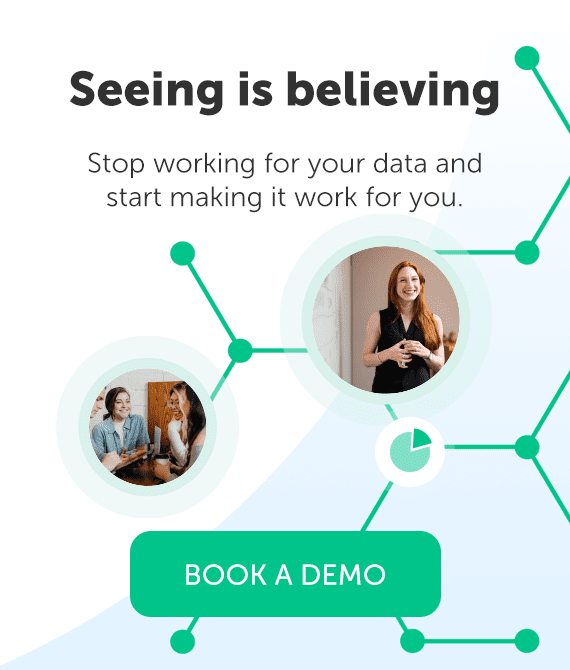AI for marketing is becoming increasingly popular among professional services firms, and the excitement is understandable. From efficiently generating content to better segmenting audiences and optimizing campaigns in real-time, AI presents incredible potential to revolutionize marketing workflows. However, despite these powerful advantages, diving headfirst into AI implementation can do more harm than good if not approached thoughtfully.
While AI can certainly enhance your firm’s capabilities, if implemented without proper planning, it can waste resources, underperform, and even harm your reputation. Tools that aren’t aligned with your brand voice or client expectations may lead to impersonal or inconsistent communications that do more to alienate your audience than connect with them. As outlined in our Chief Product Officer, Leyla Samiee’s article, “Strategies for Success in the AI Era,” Introhive adopts a deliberate approach to AI integration, ensuring it enhances current operations rather than disrupting them. By focusing on long-term success rather than quick wins, businesses can unlock AI’s true potential without introducing unnecessary risks.
Below, we explore how AI is already impacting marketing and how a careful, deliberate approach can help you maximize its potential in your firm.
Navigating the rise of AI in professional services
As AI continues to grow, its applications in marketing are rapidly expanding. AI for marketing goes far beyond simple automation—it enables smarter decision-making, better personalization, and more efficient campaign management to accelerate growth from your existing client base. AI-powered tools can analyze your existing clients to create targeted content, improving engagement and enhancing the customer experience.
Instead of spending hours crafting emails, blogs, or social media posts, AI can automate and customize content, ensuring faster production that’s relevant to each audience segment. It also allows real-time performance monitoring, helping you adjust campaigns dynamically based on audience behavior. According to a recent survey by the Legal Marketing Association (LMA), more than 13% of firms are already utilizing AI tools like ChatGPT for digital engagement, a number expected to rise as the technology becomes more refined and accessible.
However, jumping into AI for marketing without proper alignment carries significant risks. Without deliberate planning, AI may bypass the human touch and insights that resonate with your clients. For example, relying on AI to generate content that doesn’t match your brand’s tone can lead to impersonal or disjointed communications. Over-reliance on AI without human oversight can also result in tone-deaf messaging or missed opportunities for authentic engagement.
The key to successful AI implementation in your marketing lies in aligning these powerful tools with your unique voice, vision, and client expectations. This means integrating AI solutions in a way that empowers your human marketers rather than replacing them—allowing for greater efficiency without losing the personal touch that builds client trust.
The dangers of rushing AI implementation
AI has already become a key focus for many organizations with as many as 64% of CMOs having already implemented some form of AI in their marketing tech stacks. However, as many as a fifth of CMOs have also identified AI as their primary development focus for the next 12 months—showing that while many are adopting quickly, not all have fully realized AI’s potential yet. Rushing this development could lead to negative outcomes if not thoughtfully executed.
Here are some key dangers to consider:
Poor fit with business or client needs
If you adopt AI without a clear understanding of how it supports your goals, you could end up investing in tools that don’t add value. This is particularly true in marketing. If your AI doesn’t align with your audience or your campaigns, you might waste resources and even lose trust with your clients.
Underestimating AI’s complexity
AI isn’t a “set it and forget it” solution. It requires thoughtful planning, integration, and human oversight. If you rush to implement AI in your marketing efforts, you may find that the tools don’t perform as expected—or worse, they disrupt your current processes, creating inefficiencies.
Insufficient data infrastructure
AI is only as good as the data it’s built on. If your data isn’t properly managed or cleaned, implementing AI too soon will only amplify those issues. This is particularly crucial for AI in marketing, where data insights drive personalization and engagement. Bad data can lead to poor outcomes and misguided decisions.
High costs with poor ROI
The excitement around AI can often lead to expensive implementations without a clear path to return on investment. This is a risk you face if you adopt AI without a strategy. In marketing, this could mean spending big on tools that don’t actually improve your customer engagement or campaign performance.
Employee resistance
Your team may see AI as a threat to their jobs if they’re not prepared for the changes it brings. Rushing into AI adoption without addressing these concerns can lead to resistance, which will reduce the overall effectiveness of the technology. In marketing, for example, your team may feel that their creativity or strategic input is being replaced, when in fact, AI should enhance those roles.
The technical risks surrounding AI
Implementing AI for marketing requires more than just deploying tools—it demands robust governance, clear policies, and proper staff training. Without these, you risk ethical issues, biased outputs, or even legal repercussions, especially when it comes to data privacy and compliance.
AI’s ability to process large datasets is a major advantage, but it also increases the possibility of violating privacy regulations if not carefully managed. This is particularly important when using AI for marketing, as mishandling client data can erode trust and damage your firm’s reputation.
How poor data quality can undermine your AI strategy
One of the most important considerations that’s often overlooked is the quality of your data. AI’s effectiveness is directly tied to the data it processes—poor-quality data, whether inaccurate, outdated, or incomplete, can lead to flawed insights and ineffective marketing efforts. For example, if your customer data is inconsistent or missing key information, AI might push irrelevant content to the wrong segments, negatively impacting personalization and reducing engagement.
Low-quality data can result in unreliable predictions, incorrect targeting, and even bias in AI algorithms, which can further complicate compliance and ethical standards. Additionally, if AI outputs based on poor data cause errors or contradictions, it can lead to low internal adoption, as staff lose confidence in the tool’s capabilities.
To maximize the value AI delivers, focusing on data cleaning and maintenance is a smart first step. Ensuring your data is up-to-date, accurate, and consistent across departments will improve the quality of AI-generated insights and inform better marketing strategies. Routine data audits, coupled with clear governance policies, can help ensure a foundation of quality data.
Ongoing AI governance
Establishing an AI Governance Committee to oversee platforms and monitor data practices can be an effective way to maintain oversight and ensure safeguards evolve alongside your AI usage. This proactive approach also helps your marketing team stay compliant with data privacy regulations like PIPEDA, CCPA, and GDPR, while adapting to industry-specific requirements.
Equally important is the adoption of AI tools that adhere to high ethical standards. Safeguarding client data and mitigating risks—such as bias in AI-generated content or audience segmentation—should remain a core focus. A well-defined AI ethics framework, coupled with routine audits, can further ensure trust and protect your firm from reputational and legal risks, while helping clients understand how their data is being processed and used.
How to avoid the pitfalls of rushing AI
You don’t need to rush into AI to reap its benefits. In fact, a measured approach can maximize its impact and help avoid common pitfalls. Here’s how you can approach AI:
Develop a clear AI strategy
Identify the specific challenges AI can address and integrate it within your broader business goals. For AI in marketing, this might mean focusing on tools that personalize customer experiences or automate repetitive tasks.
Pilot and test AI solutions
Rather than deploying AI organization-wide, run small pilots in select areas. This lets you test effectiveness before scaling. Try testing campaign optimization or content generation tools in smaller initiatives to gain practical insights.
Invest in staff training
AI succeeds when employees are equipped to use it. Invest in training, so your team learns to leverage AI tools effectively. In marketing, staff should see how AI enhances creativity and strategy—not as a replacement, but as a tool for growth.
Continuous monitoring and feedback
AI isn’t a “set it and forget it” tool. Regularly assess performance and gather feedback to fine-tune its application. Closely monitor campaign outcomes and use data-driven insights for future improvements.
How Introhive is approaching AI for marketing
Our focus on AI for marketing is all about delivering tangible value by aligning the right technologies with specific client needs. Rather than adopting AI simply for innovation’s sake, we prioritize implementing tools that provide clear, measurable benefits.
A prime example is our new AI Account Summaries feature, designed to enhance decision-making and strategic planning. This tool enables marketing professionals to rapidly update stakeholders on the firm’s relationship status with key accounts. By automating the analysis of complex relationship metrics, Introhive’s AI Account Summaries turn dense data into concise, actionable insights. In the world of professional services, where maintaining strong client relationships is essential to success, this feature empowers marketing teams to make quicker, more informed decisions.
Looking ahead, we’re expanding our AI capabilities even further. Beyond automating workflows, we aim to generate deeper, more meaningful insights by analyzing multiple data sources, enabling firms to save time and unlock new strategic opportunities through advanced data interpretation.
Ready to unlock the full potential of AI for marketing? Book a demo today to learn how Introhive can help you successfully integrate AI into your marketing efforts without compromising on quality or client trust.





